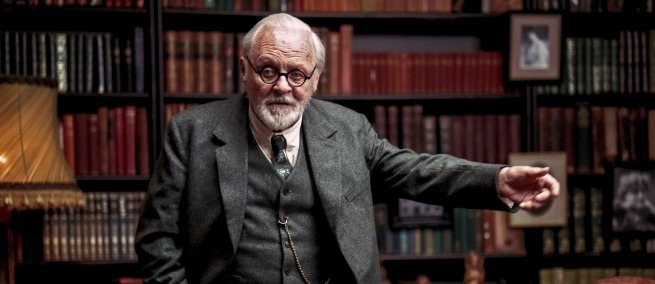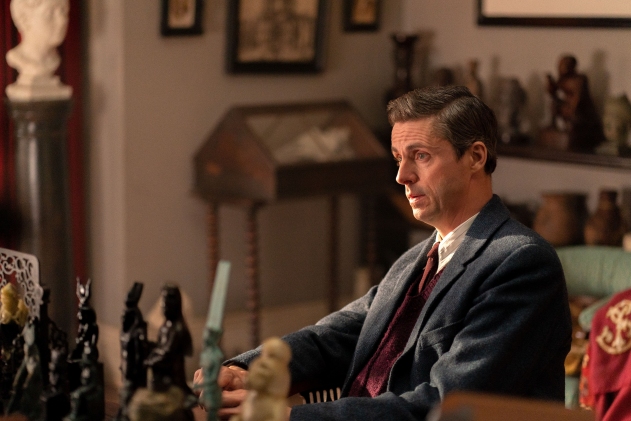
FREUD’S LAST SESSION stars Anthony Hopkins as the storied father of psychoanalysis, Sigmund Freud. It is set in London in 1939, months before Freud’s death. Freud fled Austria for London, together with his daughter Anna Freud (Liv Lisa Fries), escaping Nazism. Adapted from Mark St. Germain’s play Freud’s Last Session, the film depicts the meeting of author C.S. Lewis (Matthew Goode) and Freud. The film is written and directed by Matthew Brown (THE MAN WHO KNEW INFINITY), and co-written by Mark St. Germain. It will be released into theaters on December 22. We spoke with Brown about the film’s themes, the aspects of Freud’s life and personality he wanted to draw out, and the reception of the film within the psychoanalytic community.
Science & Film: Both FREUD'S LAST SESSION and your last film, THE MAN WHO KNEW INFINITY, are films about rather mythical figures. I'm curious about what you see as the connection between these projects and your impulse to tackle the lives, or moments in the lives, of such people?
Matthew Brown: After doing INFINITY, I was pretty ready to run for the hills. When I was brought this script, I was like, no, no, no, no. My father's a psychiatrist, so I was like, this is a recipe for disaster because thematically, it was just so close to [home]. It's also exactly what you're saying, you've got these figures, but it's the themes underneath that get their hooks into you. I had put the script down so many times, and it just always drew me back because of the underlying themes. Science and religion. It's really the question of the of our time right now. This was six years ago when the script first came to me. It just felt very, very timely. strangely enough. I mean, who would have thought the story about C.S. Lewis and Sigmund Freud coming together would be timely? But it's knocking on the door. It's saying here, let me in. That's why I felt compelled to try to make the film.
S&F: You also bring in the story of Anna and Dorothy, which people might know, but is certainly not as well known...
MB: I didn't think they were [that well known]. We had the same thing with THE MAN WHO KNEW INFINITY, where the people of the time whitewash [people out] and history doesn't know the difference. With this film, Anna Freud and Dorothy, it's something that nobody wanted to ever, ever address or talk about. Even today, it's not something that's not really well known. I think the same could be said for C.S. Lewis in a lot of ways, because he had this relationship that went on for, like, 35 years with Janie Moore that nobody really wants to talk about, or address. But if you want to know anything about these people, then you probably should know the truth, because it's who they are.

Matthew Goode as C.S. Lewis. Photographer: Sabrina Lantos. Courtesy of Sony Pictures Classics
S&F: I noticed in the film that you included a lot of the art on Freud's desk, why was that important to you to show?
MB: That's something that isn't well known, and it's fascinating, actually, and we got to work closely with the [Freud] Museum. Luciana Arrighi, who was also the production designer on my last film, she worked closely with the museum and they were doing 3D imaging of all the figures [from Freud's desk]. We really tried to replicate that office because it's almost like an aspect of Freud's personality, which is showing on screen all the time.
I learned a lot from my father, too, who's a pretty well-read psychiatrist, and he has read a lot about Freud over the years. He was telling me, the thing about Freud was just the intellectual curiosity. He was somebody who wasn't afraid to make mistakes or be wrong. If he felt like something that he had come up with was obsolete, he just moved on. And so it's funny, because I think people look back a lot on Freud and say, he was so rigid. But I think if he was alive today, he probably would have been like, my theories are crazy, and I'm gonna go on to new theories. I sort of love that aspect of him. I think it's seen in a way in that production design or in his own production design of his surroundings; you can see his curiosity at the world and humankind and behavior.
S&F: Were there other aspects of Freud's personality—his insights, his work—that you wanted to convey in terms of your direction?
MB: I didn't want to depict two screaming men in a room. And I don't think Freud was like that. Talking to people who have studied Freud over the years, one of the things that really came up a lot was that this man had a really good sense of humor. Not just in telling these jokes, which were just so not funny, which is kind of funny, but I think that he really enjoyed life. I wanted that to come across with Freud. That was something that Hopkins really embraced as well. When an audience, so far, is watching the film and they're engaging in it, I know it because they're laughing. There is humor here. It's not comedy, but...
S&F: Anthony Hopkins does an incredible job, why did you choose him for the role?
MB: For me, he was the... he's the dream. I think he is probably the greatest living actor in many ways. It was preposterous to even think we could get him. So you try, you know, because that's your obligation to yourself. We tried and we failed, and then I did some more work on the screenplay. Then we went back to him for a second trial. Very, very, very fortunately, he wanted to engage. I didn't know what that would mean, I was so blown away. I figured it would be one of those situations where you just stand back and get out of the way completely, which I would have been fine with. But he doesn't work that way. And it was the most incredible year of engagement with Hopkins, with discussions and delving deep into the psyche of the character that he was creating, because he's creating his own Freud. We're not making a biopic here, so there was freedom because of the fictional nature of the whole story.
S&F: What are you working on next?
MB: I'm working on writing something right now that is in the vein of these other two films. I think I’m going to keep getting drawn into these big themes. But then, I'm looking to do something that's going to be quite a bit different. I have a couple projects swirling and we’ll see what emerges first, but I'm hoping to do all of them. It's exciting to try something different. Maybe even a comedy or romantic comedy.
S&F: Lastly, I’m curious, has your dad seen this film?
MB: He and his partner saw the film and they really enjoyed it. That was great. That happened on INFINITY with the mathematicians, they really embraced the film and that meant so much to me. This film has been shown to psychoanalytical groups and so far, the response has been very positive, so I hope it continues. Out of THE MAN WHO KNEW INFINITY I created a foundation, The Infinity Arts Foundation that is a tiny, tiny version of what Sloan does trying to help these kinds of films and I just, I'm in awe of Sloan and the amazing work to help these kinds of films get made.
♦
FILMMAKERS
TOPICS